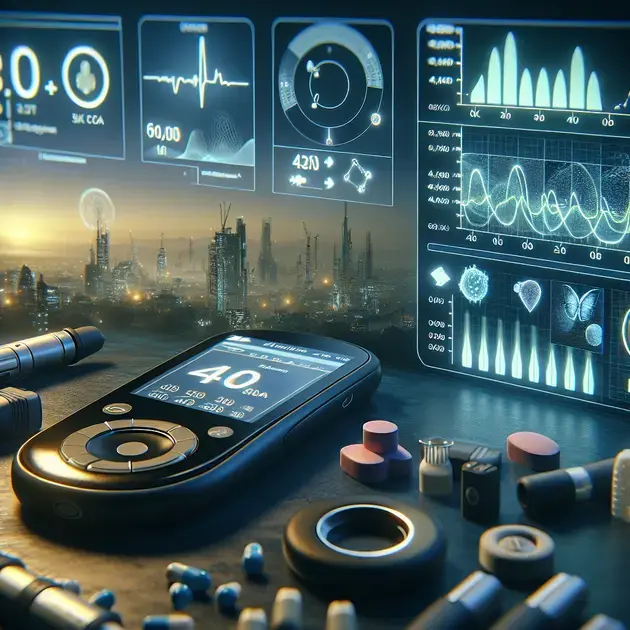When it comes to managing diabetes, understanding blood glucose levels is crucial. By closely monitoring and controlling these levels, individuals can better regulate their condition and prevent complications.
With the help of advanced technology and medical devices, it has become easier than ever to track blood glucose levels accurately and efficiently. This comprehensive guide will cover everything you need to know about understanding blood glucose levels and how to maintain them within a healthy range.
The Importance of Blood Glucose Monitoring
Monitoring blood glucose levels is crucial for people with diabetes to manage their condition effectively. Regular monitoring can help individuals make informed decisions about their diet, exercise, and medication to keep their blood sugar levels in check. One popular app for tracking blood glucose levels is MySugr, which allows users to log their readings, set medication reminders, and track trends over time. By monitoring regularly with such apps, individuals can identify patterns and make necessary adjustments to their diabetes management plan.
In addition to tracking blood glucose levels, monitoring can also help prevent severe complications associated with diabetes, such as diabetic ketoacidosis or hyperglycemia. Continuous monitoring devices like Dexcom provide real-time data on glucose levels, offering greater convenience and accuracy compared to traditional fingerstick tests. By using these advanced monitoring tools, individuals can closely monitor their glucose levels and take immediate action if needed.
Furthermore, regular monitoring can provide valuable data for healthcare providers to assess the effectiveness of the current treatment plan and make adjustments as necessary. By sharing the data collected from monitoring devices or apps with their healthcare team, individuals can work together to optimize diabetes management and improve overall health outcomes.
Overall, the importance of blood glucose monitoring cannot be overstated for individuals with diabetes. By staying vigilant and monitoring regularly, individuals can take control of their condition and lead a healthier, more active life.
Understanding Normal Blood Glucose Levels
Normal blood glucose levels are essential for overall health and well-being. For individuals without diabetes, the target range for fasting blood sugar is typically between 70 to 100 mg/dL. This can vary slightly depending on individual circumstances, so it’s important to consult with a healthcare provider for personalized guidance.
One way to understand normal blood glucose levels is to utilize reputable sources such as the American Diabetes Association website. They provide comprehensive information on what constitutes normal blood sugar levels, as well as details on how to interpret test results and take appropriate action if levels fall outside the normal range.
It’s worth noting that factors such as age, weight, and activity level can influence blood glucose levels, so maintaining a healthy lifestyle through regular exercise and a balanced diet is crucial. Apps like Glucose Buddy can help individuals track their food intake, exercise, and medication to better understand how these factors impact their blood sugar levels.
By educating oneself on normal blood glucose levels and the factors that can affect them, individuals can make informed choices to support their overall health and well-being. Regular monitoring and understanding of blood sugar levels are key components of diabetes management.
Tips for Maintaining Healthy Blood Glucose Levels
Maintaining healthy blood glucose levels is essential for individuals with diabetes to prevent complications and improve quality of life. One effective tip is to follow a well-balanced diet that includes a variety of nutrient-dense foods such as fruits, vegetables, whole grains, and lean proteins. Apps like MyFitnessPal can help individuals track their daily food intake and make healthier choices to manage their blood sugar levels.
Regular physical activity is also crucial for managing blood glucose levels. Engaging in activities like walking, cycling, or swimming can help lower blood sugar levels and improve insulin sensitivity. Fitness apps like Fitbit can track exercise routines and provide feedback on daily activity levels to ensure individuals meet their fitness goals.
In addition to diet and exercise, stress management plays a significant role in maintaining healthy blood glucose levels. High levels of stress can elevate blood sugar levels, so practicing relaxation techniques such as meditation or yoga can help manage stress levels effectively. Apps like Calm or Headspace offer guided meditation sessions to promote relaxation and reduce stress.
By incorporating these tips into daily routines and utilizing technology such as apps for tracking food intake, exercise, and stress levels, individuals can better manage their blood glucose levels and lead a healthier, more balanced lifestyle.
**Optimal Diet for Managing Blood Glucose**
Dietary Recommendations for Managing Blood Glucose Levels
When it comes to managing blood glucose levels, diet plays a crucial role in controlling sugar levels in the body. A diet rich in whole foods, such as fruits, vegetables, whole grains, and lean proteins, can help stabilize blood sugar levels throughout the day. Foods high in refined sugars and carbohydrates can cause blood sugar spikes, leading to energy crashes and potential long-term health complications.
Incorporating Fiber-Rich Foods Into Your Diet
Fiber-rich foods, such as legumes, oats, and broccoli, can help slow down the absorption of sugar into the bloodstream, preventing sudden spikes in blood glucose levels. Including these foods in your daily meals can contribute to better blood sugar control and overall health.
Choosing Healthy Fats and Proteins
Opting for healthy fats, such as avocados, nuts, and olive oil, can help improve insulin sensitivity and reduce inflammation in the body. Additionally, incorporating lean proteins like fish, chicken, and tofu can aid in managing blood sugar levels and promoting satiety.
Monitoring Portion Sizes and Meal Timing
Controlling portion sizes and spacing out meals throughout the day can also impact blood glucose levels. Eating smaller, balanced meals every few hours can prevent drastic fluctuations in blood sugar and help maintain energy levels.
Hydration and Its Importance
Staying hydrated is essential for overall health and can also influence blood sugar regulation. Drinking an adequate amount of water throughout the day can help prevent dehydration, which may affect blood glucose levels and impact how the body processes sugar.
**Daily Lifestyle Habits to Control Blood Sugar**
Importance of Regular Physical Activity
Engaging in regular physical activity is key to controlling blood sugar levels and improving overall health. Exercise helps the body use insulin more effectively, allowing for better regulation of blood glucose levels. Whether it’s cardio, strength training, or yoga, incorporating daily exercise can make a significant difference in managing blood sugar levels.
Creating a Consistent Sleep Schedule
Getting an adequate amount of quality sleep each night is essential for blood sugar control. Lack of sleep can disrupt hormonal balance, leading to insulin resistance and potential spikes in blood glucose levels. Establishing a consistent sleep routine can support better blood sugar management and overall well-being.
Stress Management Techniques
Chronic stress can elevate blood sugar levels and impact insulin sensitivity. Practicing stress-reducing activities like meditation, deep breathing exercises, and mindfulness can help lower stress levels and improve blood sugar regulation. Finding healthy ways to manage stress is crucial for maintaining optimal blood glucose levels.
Regular Blood Glucose Monitoring
Monitoring blood sugar levels regularly can provide valuable insights into how lifestyle habits are affecting glucose levels. Keeping track of blood sugar levels throughout the day can help identify patterns and make necessary adjustments to diet, exercise, and stress management strategies to maintain optimal blood sugar control.
Supportive Community and Resources
Surrounding yourself with a supportive community and accessing valuable resources can make managing blood sugar levels easier and more effective. Joining support groups, attending educational workshops, and seeking guidance from healthcare professionals can offer the necessary tools and encouragement to stay on track with blood sugar management.
**Impact of Exercise on Blood Glucose Levels**
Role of Exercise in Blood Glucose Regulation
Exercise plays a significant role in regulating blood glucose levels by increasing insulin sensitivity and improving glucose uptake by the muscles. Physical activity can help lower blood sugar levels both during and after exercise, promoting better overall blood sugar control.
Aerobic vs. Strength Training for Blood Sugar Management
Aerobic exercise, such as running, cycling, or swimming, can help lower blood sugar levels by increasing insulin sensitivity and enhancing glucose utilization in the muscles. On the other hand, strength training exercises, like weightlifting or resistance training, can also improve blood glucose control by building lean muscle mass and supporting metabolic function.
Timing and Duration of Exercise
The timing and duration of exercise can impact blood glucose levels differently. Engaging in physical activity after meals can help lower post-meal blood sugar spikes, while longer exercise sessions may improve insulin sensitivity over time. Finding a balance between different types of exercise and their timing can contribute to better blood sugar management.
Effect of Exercise Intensity on Blood Glucose
The intensity of exercise can influence how the body uses glucose for energy. Higher-intensity workouts may lead to more significant reductions in blood sugar levels during and after exercise, while moderate-intensity activities can still provide benefits for blood sugar regulation. Tailoring the intensity of exercise to individual fitness levels and health goals is crucial for optimizing blood glucose control.
Consistency and Long-Term Benefits of Regular Exercise
Consistently incorporating exercise into your daily routine can lead to long-term benefits for blood sugar management. Regular physical activity can help improve insulin sensitivity, lower blood sugar levels, and reduce the risk of developing type 2 diabetes and other metabolic conditions. Making exercise a priority can have lasting effects on overall health and blood glucose control.
**
Conclusion
**
Managing blood glucose levels requires a holistic approach that combines dietary choices, daily lifestyle habits, and regular exercise to promote optimal health and well-being. By focusing on a diet rich in whole foods like fruits, vegetables, whole grains, and lean proteins, individuals can stabilize blood sugar levels and reduce the risk of energy crashes and long-term health complications associated with refined sugars and carbohydrates.
Furthermore, incorporating fiber-rich foods, healthy fats, and proteins into daily meals can aid in controlling blood sugar levels, improving insulin sensitivity, and promoting satiety. Monitoring portion sizes, meal timing, and staying hydrated are essential practices that can contribute to better blood glucose regulation throughout the day.
In addition to dietary considerations, engaging in regular physical activity, prioritizing quality sleep, managing stress effectively, monitoring blood glucose levels, and seeking support from a community or healthcare professionals are crucial lifestyle habits for maintaining optimal blood sugar control. Consistency in exercise routines, whether aerobic or strength training, and paying attention to the timing, duration, and intensity of physical activity can significantly impact blood glucose levels and overall metabolic function.

